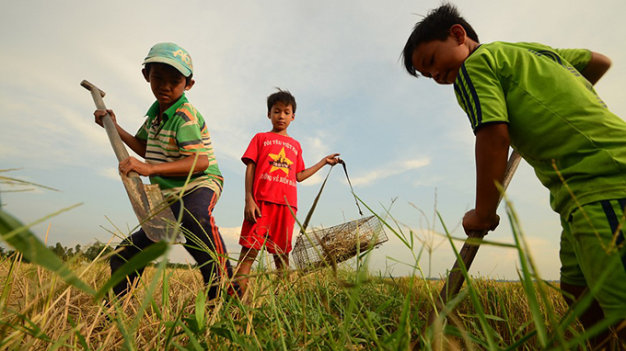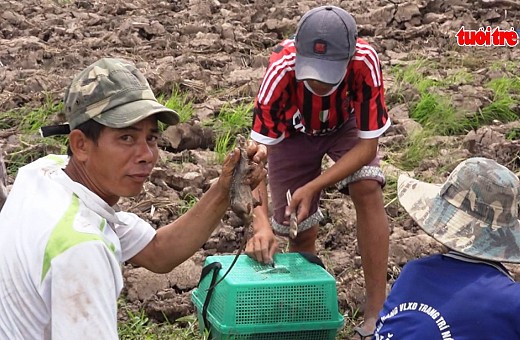Rat hunters and merchants enjoy a handsome income by snatching and selling these proliferating rodents in the Mekong Delta of Vietnam.
Every day during the rainy season, tons of rat meat is transported from the Binh Long rat market in Chau Phu District, An Giang Province, to other Mekong Delta provinces and Ho Chi Minh City for consumption.
The long-time staple of the region, the culinary use of rat meat began to spread after swine flu hit the country around 2000, causing a plunge in the consumption of pork and other livestock.
To meet the demand for the local delicacy, rat hunters and merchants make the most out of the rainy and post-harvest seasons to catch as many rats as possible.
Rat hunting can be a professional job!
Hunters go only for rice field rats, known in Vietnamese as chuot dong, rather than their dirty, disease-ridden cousins prevalent in city alleyways and sewage waterways.
Generally two types of chuot dong are most sought after.
Chuot com is a slightly smaller species of rat with a sweeter taste while chuot cong nhum is much larger (weighing as much as 1kg) and offers higher quality meat.
Rat catching involves using rudimentary tools, sometimes during cold nights, and outsmarting these stealthy creatures.
According experienced rat hunter Hai Van from Bac Lieu Province, one rule of thumb is never to say “Let’s go hunt some rats!” out loud.
Locals believe rats, which stand at the helm of the 12 zodiac animals, are so sensitive to this phrase that they flee for their lives at the very sound of it.
To avoid scaring off the rats, catchers instead say “Let’s visit little Mickey!”
Under the cover of darkness, rat hunters embark on their mission, equipped with cages the size of two decks of cards, flash lights, and self-made mini guns that shoot sharpened bicycle spokes.
Van said that seasoned hunters are able to achieve 100 percent accuracy at shooting the rats with these homemade weapons.
There is even a special name for these pros: ‘the SBC soldiers,’ which stands for the Vietnamese phrase ‘san bat chuot,’ or rat hunting.
After a hunt, Van heads straight for the makeshift rat market in the Sa Lon neighborhood of My Xuyen District, Soc Trang Province.
But is this job worth it? One hunter from Phu Loc Town, Thanh Tri District, Soc Trang Province, thinks so.
“Every night I can catch somewhere between 5-7kg of rats. This is way better than doing manual labor for others!” he said.
 |
| Children hunt for rats in An Giang Province, southern Vietnam. Photo: Tuoi Tre |
Living on the rat line
The job of a rat hunter seems painstaking considering the sleepless nights and dependence on weather conditions.
Rat merchants, on the other hand, enjoy a more relaxed working condition.
Tam Hoang, a rat merchant in Tieu Can District, Tra Vinh Province, said he earns a livable income from his job.
In many parts of the Mekong Delta, the rat business is a primary industry supporting the local economy.
Tam Phat, a rat merchant in Binh Long Commune, Phu Chau District, An Giang Province, said that in his neighborhood, “[people] sell rats all year around and only close on big holidays.”
“There’s no end to these rats because they breed so fast,” he added.
According to his observation, kids in his area are gifted rat catchers, and women excel at preparing rat meat.
From the accounts of Tu Giang, a seasoned rat catcher, more than 300 people in Binh Long Commune make a living from the rat business.
Tam Ngoc, a specialized rat meat chef also in this area, remarked that “if you’re not scared away by the stench of these rats, you can keep the money rolling in all year round.”
In Hong Ngu District, Dong Thap Province, rat meat is currently sold at VND70,000 (US$3)/kg, considerably cheaper than beef at around VND200,000 ($9)/kg.
To some people, catching rats is a wonder way of life.
Ta Duy Anh, a Tuoi Tre (Youth) newspaper reader, commented, “Rats freshly caught out of their holes are quickly submerged in heated ashes to ease the skinning process. The skin slowly turns from white to brown, and emits an intense aroma that simply takes one’s breath away.”
“If you have never had a chance to cook a rat, your life is definitely not fulfilled,” he declared.
Like us on Facebook or follow us on Twitter to get the latest news about Vietnam!






















































